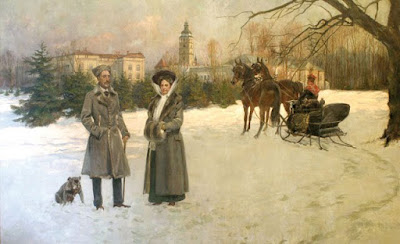Now, even in a normal year, we make them in advance and freeze them. In yet another wretched Covid year, we're still making them and freezing them so that we and a few friends can eat them in stages. Not as difficult as last year though, when we sat in the garden in the freezing cold, wrapped up in coats and blankets, to drink wine with our next door neighbours, with whom we were in a 'bubble'.
My mum and dad used to make these pierogi, and I've eaten them in Poland too. The traditional Polish Christmas Eve meal is meatless but consists of many courses, and generally includes carp. We always had pierogi. There are many variations on this recipe, and pierogi associated with different regions. But this is how to make Lwow Pierogi - with a few additions of our own.
You begin by preparing the filling. It seems to be obligatory to make twice as much filling as you need, but that's OK, because you can bake or fry any leftovers as an accompaniment to other meals.
We use any large all purpose potatoes - Maris Piper - five or six depending on size. Peel and boil till tender. Meanwhile, finely chop 2 medium or 1 large onion and fry gently in a little oil till translucent, not brown. Grate about 200 grams of any good strong cheddar. NB, the genuine Polish cheese to use is Twarog, and Quark is a good substitute, but we like a stronger flavour. It would be worthwhile experimenting with Wensleydale or Lancashire, which have more of a curd texture, but are also quite sharp. Mash the potatoes while they're still hot, with the grated or crumbled cheese and stir in the onion. Set aside to cool while you make your dough.
Sieve 500 grams of plain flour with a teaspoon of salt. Mix in two beaten eggs and enough cold water to make a soft but not sticky dough. It will be very elastic. Set aside to rest for half an hour or so.
You'll need a cup of cold water, and a pastry brush. Divide the dough into two halves, and roll out on a very well floured board until thin, but not so thin that it disintegrates! Now for the fiddly bit. Use a fairly large biscuit or scone cutter to cut out your dough into circles. A cup or glass will work just as well. Holding the circle in your left hand, put a good teaspoonful of filling onto it, brush the edges with water, and fold into half circles, like a small pasty. Gently but firmly nip the two edges together all the way along the join. If you don't get this bit right, the filling will all boil out at the next stage. But luckily, the dough is very 'self adhesive' and should form a very good bond. It's a knack and once you've done a few, it becomes easier. Curve them slightly into an ear shape. Lay them out on a floured tray. Do NOT let them overlap, or they will form a horrible mass and you will have to start again. (The voice of experience!)
You need a large pan of boiling salted water. Using a slotted spoon, carefully put the pierogi into the boiling water, five or six at a time, although a huge pot will take seven. Bring back to the boil, very gently keeping the pierogi moving so that they don't stick to the bottom, and once they are floating in boiling water, simmer each batch for five minutes, or a little longer depending on size. Take them out carefully with your slotted spoon, and lay them (still separately) on lightly greased oven trays. You'll find that you need to top up the water if you're making a large batch, and turn up the heat from time to time to keep it at a rolling boil.
After that, there are options. These would traditionally be slightly dried out and kept warm in the oven on a very low setting, and then served as one of the courses on Christmas eve, liberally covered with melted butter.
You can freeze them as soon as they have cooled - freeze them on a tray before putting them into bags or packets once they are solid, otherwise they will stick together. Thaw them before you intend to use them. We fry lots of chopped smoked streaky bacon in a little oil, and then gently fry the pierogi until they are heated all the way through, the outsides are just becoming golden and the bacon is crisp. This wouldn't be done on a Polish Christmas eve - which must be meatless - but my dad was very fond of them cooked in this way and this is usually the way we make them.
You can experiment with other fillings. Some regions use a combination of cabbage or meat and mushrooms. Lwow pierogi are made with traditional Polish curd cheeses.My dad used to make them in summer, filled with wild blueberries from the Galloway hills, served with powdered sugar and single cream.
It is, let's face it, such a faff, that you're better to make a lot at the same time - the above recipe makes about forty. They keep well in the freezer. They are much easier to make if there are two or three cooks - one to do the fiddly bit with the dough and filling, and one to man the pan and kettle, so that you can keep the batches coming. We did it this year while Carousel was on the TV, so I put together forty pierogi while weeping over poor Billy Bigelow.
Good luck! And here's hoping for the return of proper Christmas Eve parties, as soon as possible We're heartily sick of restrictions. We're physical, social beings. Isolating is, for most of us, bad for our mental health.






